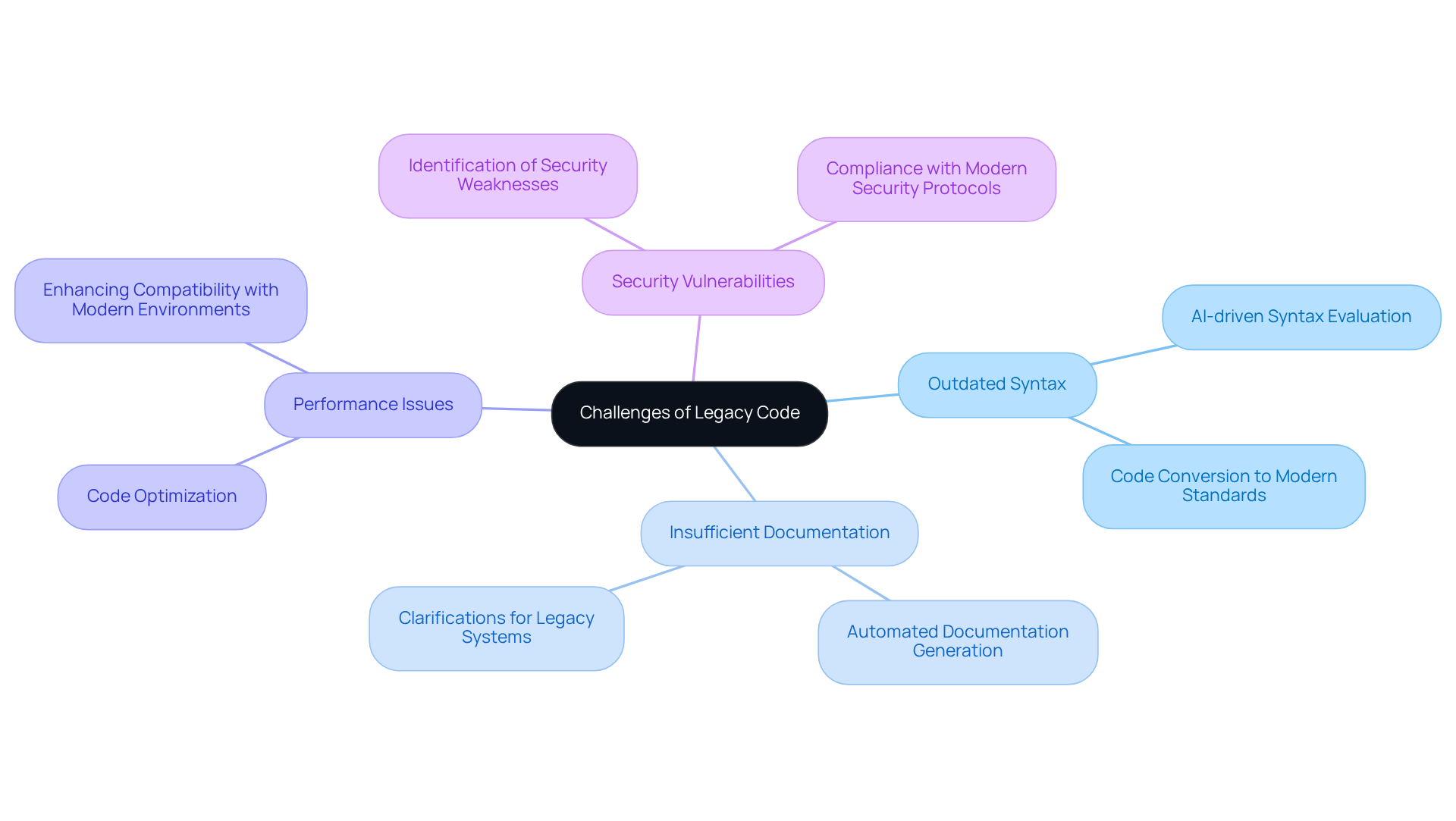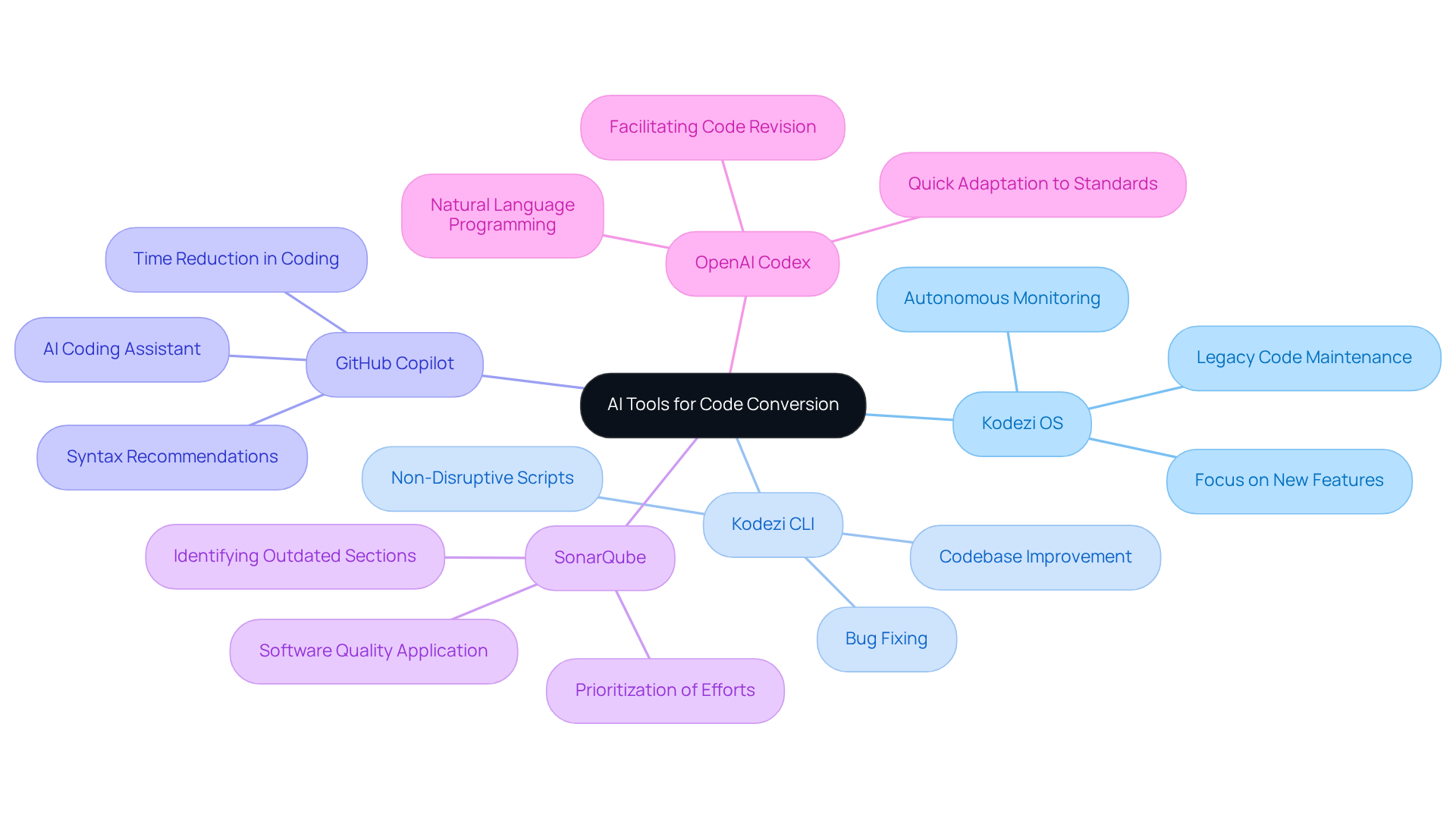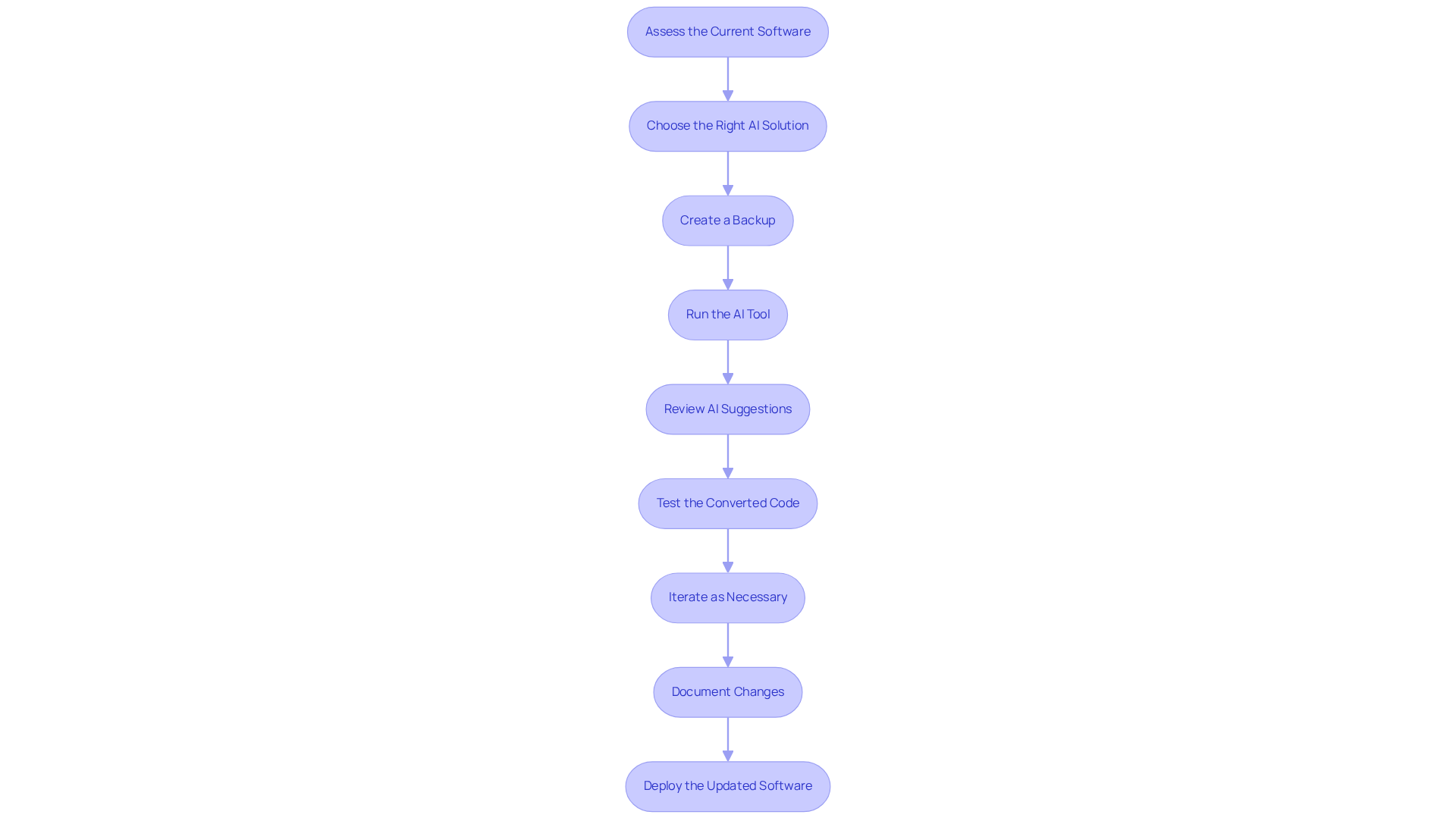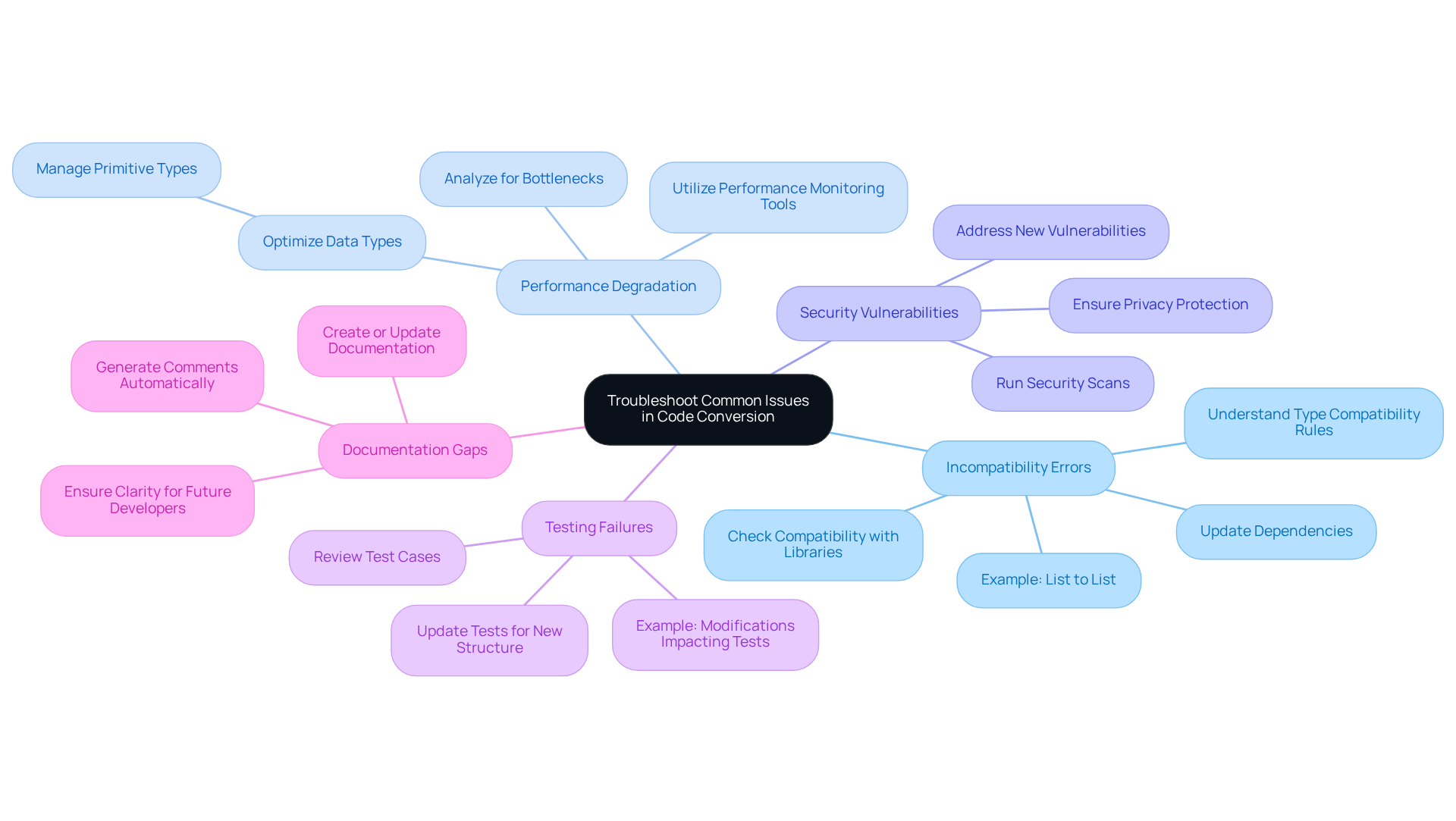Overview
Coding challenges can be daunting for developers, especially when dealing with legacy systems. Outdated software often leads to performance bottlenecks, security vulnerabilities, and syntax issues that hinder productivity. But what if there was a way to streamline this process? Enter Kodezi, an AI tool designed to tackle these very challenges.
Kodezi offers a range of features that simplify the conversion of legacy code into modern programming formats. With its advanced code assessment capabilities, developers can quickly identify areas that need attention. Furthermore, Kodezi’s conversion tools help transform outdated syntax into contemporary code, making it easier to maintain and optimize.
The benefits of using Kodezi are significant. By leveraging this tool, developers can enhance their productivity and improve code quality. Imagine reducing the time spent on manual code updates and minimizing errors that come with outdated practices. Wouldn’t that be a game-changer for your workflow?
In addition to its conversion capabilities, Kodezi addresses performance and security concerns. By optimizing code, developers can ensure their applications run smoothly and securely. This not only boosts efficiency but also instills confidence in the software’s reliability.
So, why not explore the tools available on the Kodezi platform? With its user-friendly interface and powerful features, Kodezi is poised to revolutionize how developers approach legacy code. Don’t let outdated software hold you back—embrace the future of coding with Kodezi!
Introduction
Legacy software presents significant challenges for developers, often creating barriers to productivity and integration with modern systems. These coding hurdles can be frustrating, but there’s hope on the horizon. Enter Kodezi, a tool designed to tackle these issues head-on by streamlining the process of converting outdated code into contemporary formats.
So, how does Kodezi address these challenges? With features that simplify code transformation and enhance collaboration, Kodezi empowers developers to overcome obstacles like insufficient documentation and security vulnerabilities. Imagine being able to modernize your codebase efficiently, reducing the time spent on tedious tasks and allowing you to focus on what truly matters—building innovative solutions.
The benefits of using Kodezi are clear:
- Improved productivity
- Enhanced code quality
- A smoother transition to modern systems
By leveraging AI tools, developers can navigate the complexities of legacy software with ease. Are you ready to elevate your coding practices? Explore the tools available on Kodezi’s platform and discover how they can transform your development experience.
Understand Legacy Code and Its Challenges
Legacy software presents significant challenges for developers, often hindering productivity and efficiency. Are you struggling with outdated programs that are tough to maintain or integrate with modern systems? You're not alone. Many developers face common issues when dealing with legacy software, including:
- Outdated syntax
- Insufficient documentation
- Performance issues
- Security vulnerabilities
Outdated Syntax can be a major roadblock. Older programming languages or frameworks may have syntax that current tools no longer support. Fortunately, Kodezi's AI-driven programming tool can autonomously evaluate and rectify outdated syntax, effectively enabling you to ai convert old code to new.
Insufficient Documentation is another hurdle. Many outdated systems lack the necessary documentation, leaving developers in the dark about the original purpose of the program. Kodezi can generate remarks and clarifications for programming, helping you understand how older systems operate more efficiently.
Performance Issues are also prevalent. Legacy programming often isn't optimized for today's hardware or software environments, leading to inefficiencies. With Kodezi's optimization capabilities, you can use ai to convert old code to new, enhancing the performance of outdated programs and ensuring they run effectively in contemporary settings.
Lastly, Security Vulnerabilities pose a serious risk. Outdated programming may not meet modern security standards, exposing your systems to potential threats. Kodezi assists in identifying and correcting these security weaknesses, ensuring your software adheres to current security protocols.
Identifying these obstacles is the first step toward leveraging AI to convert old code to new, transforming outdated programming into a more manageable and effective format. With Kodezi's AI resources, you can benefit from automatic debugging and optimization across various programming languages and IDEs. Why not explore the tools available on the Kodezi platform and see how they can enhance your coding practices?

Explore AI Tools for Code Conversion
In the fast-paced world of software development, outdated programming can pose significant challenges for developers. Fortunately, multiple AI applications are stepping up to convert old code to new contemporary standards. Among these, Kodezi stands out with its innovative tools designed to streamline this process.
-
Kodezi OS autonomously monitors and updates codebases, ensuring that legacy code is not only converted but also maintained over time. This means developers can focus on creating new features rather than getting bogged down by old code.
-
Kodezi CLI takes it a step further by autonomously improving your codebase and fixing bugs before they reach production. It deploys scripts that don’t disrupt your system, promptly detecting and addressing problems while offering thorough explanations. This makes it a vital resource for teams aiming to enhance programming efficiency and guarantee software quality.
-
GitHub Copilot serves as an AI-driven coding assistant that recommends contemporary syntax and practices as you transform scripts. This tool can significantly reduce the time spent on coding, allowing developers to work more efficiently.
-
SonarQube, while primarily a software quality application, helps pinpoint sections in outdated systems that require transformation or restructuring. By identifying these areas, developers can prioritize their efforts effectively.
-
OpenAI Codex can produce programming snippets based on natural language prompts, facilitating the revision of outdated scripts in a modern context. This feature allows developers to quickly adapt their code to current standards without extensive rewrites.
Each of these tools offers unique features that can streamline the process of converting old code to new. By evaluating them based on your specific project requirements, you can significantly improve productivity and code quality. Why not explore the tools available on the Kodezi platform today?

Follow a Step-by-Step Process for Code Conversion
For developers, the task of converting legacy code can be daunting, but AI can help convert old code to new formats. Are you facing challenges with outdated systems? You’re not alone. Many programmers struggle with legacy code that hampers productivity and security. Fortunately, tools like Kodezi can AI convert old code to new and help streamline this process.
Assess the Current Software: Start by thoroughly reviewing your legacy system. Identify outdated syntax, performance bottlenecks, and security vulnerabilities that could hinder functionality. This assessment is crucial for a successful transition.
Choose the Right AI Solution: After your evaluation, select an AI resource that can AI convert old code to new and is tailored to your needs. Kodezi, for instance, is an AI-assisted development tool that can AI convert old code to new while ensuring privacy protection. It’s user-friendly and integrates well with various systems. Organizations like Bank of America have effectively utilized AI assistants to manage outdated systems, showcasing the efficiency of focused AI solutions. With AI capable of generating up to 80% of feature scripts, finding the right resource to AI convert old code to new can significantly enhance your conversion process.
Create a Backup: Before making any changes, ensure you have a complete backup of your existing codebase. This step safeguards against potential data loss and provides peace of mind.
Run the AI Tool to AI convert old code to new by using the platform to analyze your legacy programming. Follow the tool's guidelines to initiate the conversion process. Kodezi not only examines bugs but also enhances your programming by providing insightful remarks, improving the overall debugging experience.
Review AI Suggestions: Once the processing is complete, carefully examine the suggestions. Do they align with your project’s goals and programming standards? This step is essential for maintaining quality. User testimonials indicate that Kodezi has helped many programmers identify and resolve issues more quickly, significantly reducing review turnaround time.
Test the Converted Code: Implement the changes in a staging environment and conduct thorough testing to ensure functionality and performance remain intact. Kodezi can assist in generating unit and integration tests, enhancing the reliability of this phase.
Iterate as Necessary: Based on your testing outcomes, make further adjustments. This might involve manually enhancing the program or re-running Kodezi to address any identified issues.
Document Changes: Update all relevant documentation to reflect the new programming structure and any modifications made during the conversion process. This ensures that future maintenance is informed and efficient.
Deploy the Updated Software: Once you’re satisfied with the results, deploy the updated software to production. Implement monitoring to quickly identify and resolve any issues that may arise post-deployment.
By following these steps and integrating AI features, you can achieve a smooth transition from legacy to modern programming by utilizing AI to convert old code to new. Kodezi not only streamlines the process but also aligns with the evolving role of developers in guiding AI, ultimately leading to more efficient software development. Why not explore the tools available on the Kodezi platform today?

Troubleshoot Common Issues in Code Conversion
Coding can be a challenging journey, especially when you need ai to convert old code to new programs. Developers often face common issues that can hinder progress. But what if there was a way to navigate these challenges more smoothly? Kodezi is here to help.
Incompatibility Errors can be a major roadblock. If your converted code isn’t running, it’s crucial to check for compatibility issues with libraries or frameworks. Make sure all dependencies are updated to their latest versions, as outdated libraries can lead to significant errors. For example, assigning a List<String> to a List<Integer> can trigger a compilation error due to incompatible types. Understanding type compatibility rules is essential, and Kodezi can assist by using ai to convert old code to new through automatic analysis and correction of programming, ensuring smoother conversions.
Performance Degradation is another concern. If your new program runs slower than expected, it’s time to analyze it for bottlenecks. Utilize performance monitoring tools to assess execution times and optimize as needed. Remember, Java's primitive data types, like int and double, can impact performance if not managed correctly during conversions. Kodezi’s optimization capabilities can enhance performance by recommending improvements based on best practices, ensuring your programming runs efficiently.
Security Vulnerabilities can arise during conversion. After the process, running security scans is vital to identify any new vulnerabilities. Addressing these issues promptly helps maintain system integrity. Conducting thorough security checks is crucial, especially when integrating new libraries. Kodezi emphasizes privacy protection, ensuring that your programming and data remain secure throughout debugging and optimization.
Testing Failures can be frustrating. If tests fail post-conversion, review the test cases to ensure they align with the new program structure. Update tests as necessary to reflect changes in functionality. For instance, a test case created for an earlier version may not be relevant after substantial modifications. Kodezi can assist in optimizing this process by offering insights into modifications and their effects on current tests.
Documentation Gaps can lead to confusion. If documentation is lacking, take the time to create or update it based on the new code. This effort will help future developers understand the changes made. Comprehensive documentation is essential, especially when dealing with complex codebases that have undergone significant transformations. Kodezi can help generate comments and documentation automatically, ensuring clarity and continuity.
By addressing these common issues, you can ensure a smoother transition to a modern codebase with the help of ai to convert old code to new. Ready to enhance your coding experience? Explore the tools available on Kodezi today!

Conclusion
Mastering the conversion of legacy code to modern standards is crucial for developers facing numerous coding challenges. Outdated systems can hinder productivity and compromise security, making it essential to find effective solutions. Enter Kodezi—an AI tool designed to help developers navigate the complexities of legacy code, transforming it into efficient, contemporary codebases. This shift not only streamlines operations but also allows developers to focus on innovation instead of being bogged down by legacy issues.
What obstacles does legacy code present? Developers often grapple with:
- Outdated syntax
- Insufficient documentation
- Performance issues
- Security vulnerabilities
Kodezi addresses these challenges head-on by providing a structured process for successful code conversion. With tools like Kodezi OS and Kodezi CLI, developers can automate updates, improve code quality, and ensure a smooth transition to modern programming practices.
Why should developers embrace AI-driven solutions for code conversion? It’s not just about keeping pace with technology; it’s about enhancing the overall quality of software development. By leveraging Kodezi, organizations can improve productivity and maintain high standards in their codebases. As the industry evolves, exploring the available tools and methodologies becomes essential for overcoming legacy code challenges.
In conclusion, taking proactive steps towards modernization with Kodezi can help organizations remain competitive and efficient in an ever-changing digital landscape. Are you ready to explore the tools that can transform your coding practices?
Frequently Asked Questions
What are the main challenges associated with legacy software?
The main challenges include outdated syntax, insufficient documentation, performance issues, and security vulnerabilities.
How does outdated syntax affect legacy software?
Outdated syntax can hinder productivity as older programming languages or frameworks may have syntax that current tools no longer support.
What solutions does Kodezi offer for outdated syntax?
Kodezi's AI-driven programming tool can autonomously evaluate and rectify outdated syntax, enabling the conversion of old code to new.
Why is insufficient documentation a problem for legacy software?
Insufficient documentation leaves developers unaware of the original purpose of the program, making it difficult to maintain or update the software.
How can Kodezi help with insufficient documentation?
Kodezi can generate remarks and clarifications for programming, helping developers understand how older systems operate more efficiently.
What performance issues are common with legacy programming?
Legacy programming often isn't optimized for today's hardware or software environments, leading to inefficiencies in performance.
How does Kodezi address performance issues in legacy software?
Kodezi offers optimization capabilities that can enhance the performance of outdated programs, ensuring they run effectively in contemporary settings.
What risks do security vulnerabilities in legacy software pose?
Security vulnerabilities can expose systems to potential threats, as outdated programming may not meet modern security standards.
In what way does Kodezi assist with security vulnerabilities?
Kodezi helps identify and correct security weaknesses, ensuring that software adheres to current security protocols.
What is the overall benefit of using Kodezi for legacy code?
Kodezi provides automatic debugging and optimization across various programming languages and IDEs, transforming outdated programming into a more manageable and effective format.




